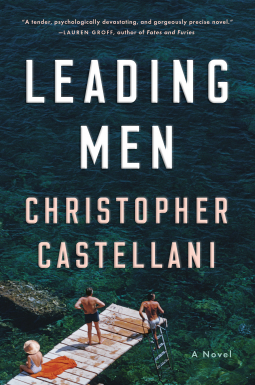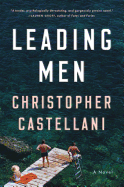Our series examining how independent bookstores around the country have navigated rising rents, lease negotiations and relationships with landlords continues throughout the week; see previous installments here.
 John Evans and Alison Reid, owners of DIESEL, a bookstore in Brentwood, Calif., have had several locations throughout the Bay Area and Southern California over the years. Evans reported that out of the eight leases they've held, the best arrangements have come from situations where landlords sought them out in the hopes of bringing an independent bookstore into one of their properties. In particular, Evans pointed to the lease for the Oakland store (which they sold in 2017 to then-manager Brad Johnson and is now named East Bay Booksellers) as "ideal." It was a "straight percentage" of the store's revenue, plus a little bit for building maintenance.
John Evans and Alison Reid, owners of DIESEL, a bookstore in Brentwood, Calif., have had several locations throughout the Bay Area and Southern California over the years. Evans reported that out of the eight leases they've held, the best arrangements have come from situations where landlords sought them out in the hopes of bringing an independent bookstore into one of their properties. In particular, Evans pointed to the lease for the Oakland store (which they sold in 2017 to then-manager Brad Johnson and is now named East Bay Booksellers) as "ideal." It was a "straight percentage" of the store's revenue, plus a little bit for building maintenance.
With that sort of rental agreement, Evans said, "You're truly a partner with your landlord." In a good year, the landlord will make a lot more money, but in a bad year, the bookstore has to pay a lot less and has the flexibility to weather unexpected storms. Said Evans: "If they dig up the street, you're not caught with a high rent."
While Evans and Reid have had good relationships with landlords in Oakland, Larkspur and elsewhere, they've also had some decidedly negative experiences. In 1989, they opened a store in Emeryville, Calif., in a public market that Evans described as similar to Seattle's famous Pike Place Market. Evans explained that the public market, which was its own entity separate from the landlord but sublet spaces to vendors, had gone bankrupt around the time that he and Reid had signed their lease. They were not told, however, until after they had signed and occupied the space, which, Evans noted, was "fraud." They managed to stay for five years, and finally left in May 1994.
In Southern California, however, Evans and Reid experienced what he described as a "nightmare scenario" with their first Malibu store. For the first four years of the store's tenure, he recalled, their landlord was a major Los Angeles developer and property owner who, while not "benevolent," charged them a reasonable rent. Things began to unravel after that landlord sold the property to a "gigantic" hedge fund. Over the next few years, the property changed hands several more times, and in each of those cases, Evans said, the landlords were essentially "real estate speculators," with no ties to the community or interest in how their projects affected it.
"It seemed like their motivation was to grind anyone with a low lease out," said Evans. "They did just brutal, horrible things. And they were not who we signed the lease with." Evans and Reid endured four years of "legal and store hell," during which they were actually sued by their landlords over lease renewal, before finally closing the store in February 2011. In November of that year they reopened in a space in the Malibu Country Mart, but by December 2013 that store was up for sale.
"That was just a bad location," Evans said. Despite having a pretty good relationship with that landlord, they simply could not do the sort of business needed to pay the rent he wanted. "In his mind he was giving us a break. But by any other measure it was unsustainable."
When asked what advice he'd give to someone looking to open a bookstore or navigating lease negotiations for the first time, Evans recommended using ABACUS data and other "nuts and bolts" information to explain the bookselling business model to people like bankers and landlords who may have nothing but misconceptions about the business. And as they're explaining the reality of the situation, booksellers can also emphasize why they're valuable as anchor tenants and community builders
He also pointed to two important things to watch out for with leases themselves: one is making sure there's a way to get out of the lease, and the other is cost-of-living increases. Evans noted that often landlords will try to "throw in" a 3%-5% increase every year, but it "shouldn't be over 3%."
Asked if there were any last things he'd add about the subject, Evans replied: "Watch out for hedge funds." --Alex Mutter
 "But what I am is a former bookseller who now spends my days talking about what it takes to make our communities financially stronger. As someone who's been a student of cities for years--as well as someone who's spent a 13-hour day managing a signing line for Chuck Palahniuk--the longer I study, the more I believe that independent bookstores have a lot to teach us. They are a case study in the power of small, incrementally-built retail to anchor our local economies and social communities. And in my years since stepping out from behind the counter, I've come to believe something even more radical: if we want our places to be strong, third places like independent bookstores are exactly the kind of investment that our towns should be making. And we should be making them way more often."
"But what I am is a former bookseller who now spends my days talking about what it takes to make our communities financially stronger. As someone who's been a student of cities for years--as well as someone who's spent a 13-hour day managing a signing line for Chuck Palahniuk--the longer I study, the more I believe that independent bookstores have a lot to teach us. They are a case study in the power of small, incrementally-built retail to anchor our local economies and social communities. And in my years since stepping out from behind the counter, I've come to believe something even more radical: if we want our places to be strong, third places like independent bookstores are exactly the kind of investment that our towns should be making. And we should be making them way more often."









 The official catalog of exclusive items for
The official catalog of exclusive items for 
 Genoways "has written critically about President Donald Trump, the Keystone XL pipeline and Nebraska's all-GOP congressional delegation, but says he has also questioned Obama administration policies," the AP wrote. This Blessed Earth chronicles a Nebraska farm family struggling to stay afloat in the midst of shifting trade policies and climate change. His 2014 book, The Chain, examined problems caused by major slaughterhouses.
Genoways "has written critically about President Donald Trump, the Keystone XL pipeline and Nebraska's all-GOP congressional delegation, but says he has also questioned Obama administration policies," the AP wrote. This Blessed Earth chronicles a Nebraska farm family struggling to stay afloat in the midst of shifting trade policies and climate change. His 2014 book, The Chain, examined problems caused by major slaughterhouses.
 John Evans and Alison Reid, owners of
John Evans and Alison Reid, owners of  Tuesday night, Shelf Awareness and the Publishers Advertising & Marketing Association hosted the first annual Golden Vik Awards, honoring the best of the more than 4,000 ads that we ran last year. At the event, with their awards for advertising excellence (l. to r.): Judy Hottensen of Grove Atlantic (Most Clicked GLOW/Galley Love of the Week); Brianna Yamashita of Houghton Mifflin Harcourt (Most Clicked Shelf Pro E-blast); Valerie Pierce of Sourcebooks (Most Clicked Shelf for Readers Ad); Shelf Awareness publisher Jenn Risko; Seth Morris of Crown (Most Clicked Consumer E-blast); and Erica Martirano of St. Martin's, standing in for Flatiron's Nancy Trypuc (Most Clicked Shelf Pro Ad).
Tuesday night, Shelf Awareness and the Publishers Advertising & Marketing Association hosted the first annual Golden Vik Awards, honoring the best of the more than 4,000 ads that we ran last year. At the event, with their awards for advertising excellence (l. to r.): Judy Hottensen of Grove Atlantic (Most Clicked GLOW/Galley Love of the Week); Brianna Yamashita of Houghton Mifflin Harcourt (Most Clicked Shelf Pro E-blast); Valerie Pierce of Sourcebooks (Most Clicked Shelf for Readers Ad); Shelf Awareness publisher Jenn Risko; Seth Morris of Crown (Most Clicked Consumer E-blast); and Erica Martirano of St. Martin's, standing in for Flatiron's Nancy Trypuc (Most Clicked Shelf Pro Ad). In the wake of last week's news that Common Good Books, St. Paul, Minn., was being put up
In the wake of last week's news that Common Good Books, St. Paul, Minn., was being put up  Everyday Millionaires: How Ordinary People Built Extraordinary Wealth--and How You Can Too
Everyday Millionaires: How Ordinary People Built Extraordinary Wealth--and How You Can Too From the Italian Riviera of the 1950s, in all its earthy glamour, to the luxurious sanctuary of an aging film star's modern-day Manhattan apartment, Christopher Castellani's Leading Men transports readers across time, place and its characters' aching, flawed hearts.
From the Italian Riviera of the 1950s, in all its earthy glamour, to the luxurious sanctuary of an aging film star's modern-day Manhattan apartment, Christopher Castellani's Leading Men transports readers across time, place and its characters' aching, flawed hearts.